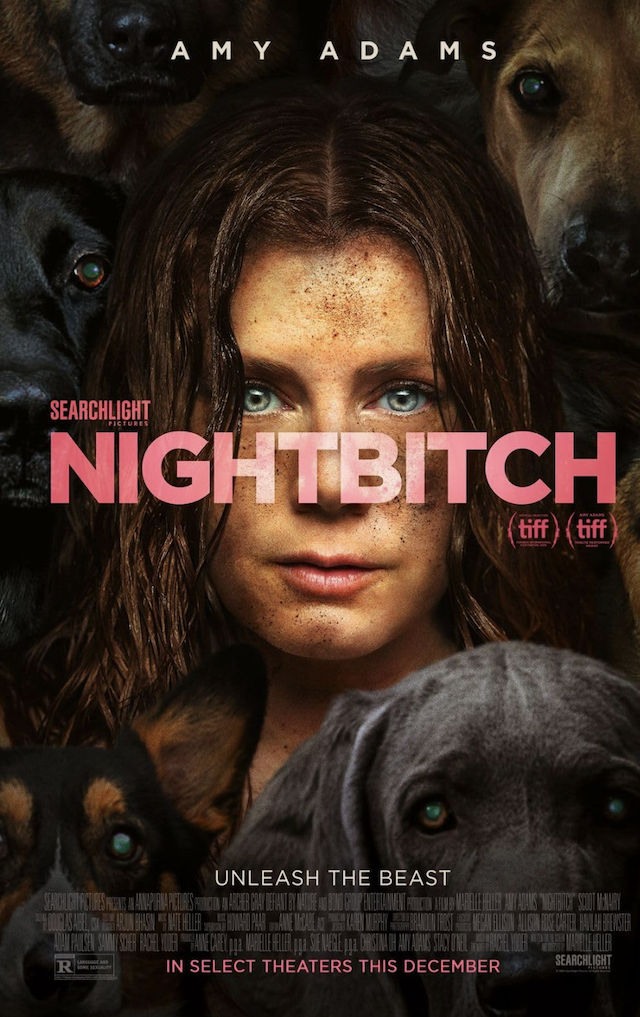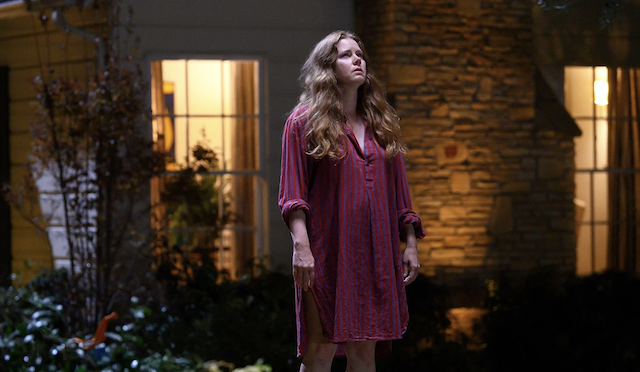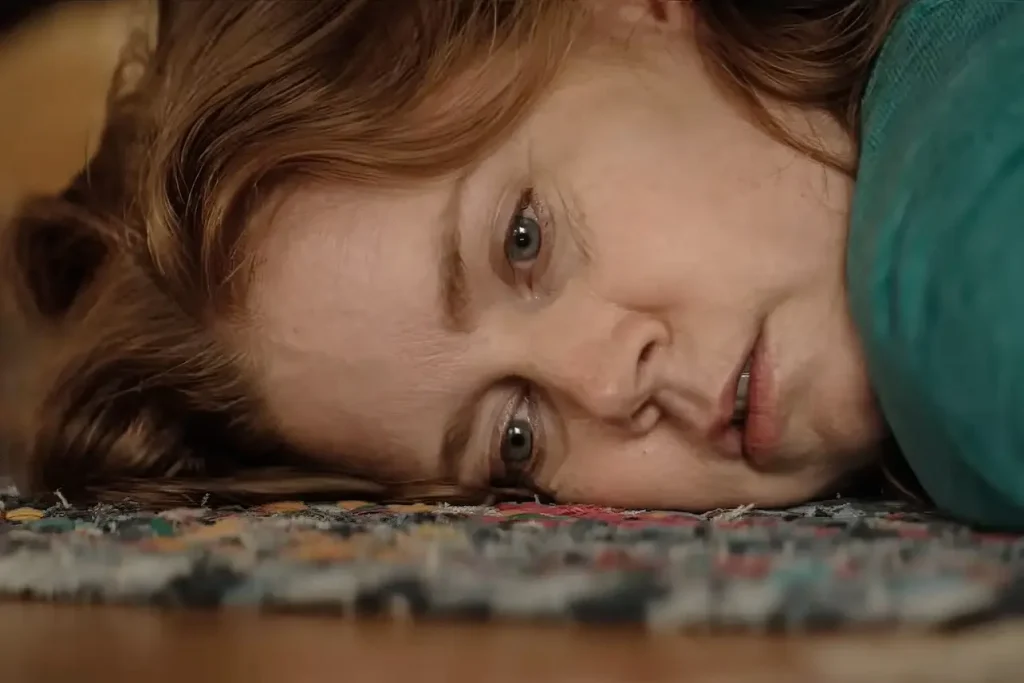
@Courtesy of Searchlight Pictures

Q: What was it about the script that captivated you and made you want to take on this role of mother?
Amy Adams: I originally read the novel. It was brought to me by Sue Nagel, who’s been at Annapurna Pictures for development. It was in manuscript form before it had been officially released in publication. Rachel Yoder’s book had a really unique perspective and narration, it just offered the opportunity to explore themes of community and transformation, of course motherhood, parenthood, relationships. There was so much I identified with. Being a mother but also being a spouse, a human being. The feral quality of the mother’s internal monologue, how unfiltered it was really connected with me, I really related to that really active internal monologue and I thought it could be a great opportunity on film to explore different techniques of storytelling as well. And then we brought Marianne in and she did a wonderful adaptation.
Q: What did being a producer mean for you and in addition to starring in the film?
Amy Adams: I love getting to brainstorm about what voice or talent we want to bring on. Marielle was on the top of my list, of all of our lists. Being an active part of seeking her out, engaging in conversations, engaging in perspectives through the development of the script. She’s got a great team, I knew that she’d have a strong perspective. At some point you turn it over to let her develop her own style of filmmaking, giving her the best environment and support to help elevate her voice.
Q: What did make her the top of your list?
Amy Adams: The narration was so specific, I knew we would have to have somebody who wasn’t afraid of exploring tone and genre. In her other films, she does such a great job at using creative narration to explore outside of the typical, she uses much more unusual storytelling techniques. Especially in Diary of a Teenage Girl and A Beautiful Day in the Neighborhood. Then she also has a wonderful way of creating characters that are well balanced, very fairly approached. There’s not necessarily an antagonist and a protagonist. It’s just balanced storytelling. She has a real deep connection with the truth of the human experience in any given situation that I saw in her previous works.
Q: What kind of discussions did you have with Marielle about the mood of the film and how did you convey that theme?
Amy Adams: Again, we had a great resource in the novel. One of the things we wanted to keep was the very grounded, very truthful exploration of this woman. We didn’t want to comment on it, we wanted this mother to feel really just drenched in her isolation and transformation. We had a lot of conversations about what would be used in voiceover versus what would be active monologues. Marielle had a really great point of view, we recorded a lot of voiceovers and then spoken monologues. What would work in which situation and what we felt best communicated outward was a lot of fun to discover.
Q: Of all the universally relevant themes that the film explores, which one resonated the most with you?
Amy Adams: I think identity. These moments where we feel sort of detached from our personal view of ourselves and stuck in between two places in our life, whether it’s career changes, puberty, there’s lots of moments where I know I personally have felt detached from a previous view point of myself, but not yet sure where I’m heading. That resonated deeply with me. This idea of feeling invisible, feeling you’re not sure how people are seeing you.

@Courtesy of Searchlight Pictures
Q: Was there a scene that didn’t make it into the final cut that you secretly wish it stayed in, or is there a scene that you would have loved to explore even further?
Amy Adams: It’s funny, sometimes when I see the final film, I forget what seems to have made it in or what didn’t. There was one more running with the dogs. That was a lot of fun. Marielle did such a good job at editing her own work, shaping the stories.
Q: Was there a particular moment or line in the film that made you see the character in a new light?
Amy Adams: – There were so many. When she’s talking to herself, when we see her in bed judging herself in the way that she could have done everything better, how everything’s her fault and if she’d made different choices then her life would look different, all of that was very relatable.
Q: Which of your own experiences were you able to channel to make Mother such a raw and authentic character?
Amy Adams: – One of the things I related so deeply to was the lack of communication. I love how the movie portrays that the father’s not a villain, he’s not the antagonist in any way. There’s just such a deep lack of connection and communication about what’s really happening that I really identified with. She thought she could make everything work, I really identified with that. If she just kept doing it, if she could do it better, if she could do it differently, if she could try it this way, that sort of responsibility that she put on herself to be the single person to change everything for everybody. I definitely identified with that aspect.
Q: Besides the script, did you take inspiration from any movies or books to understand the transformation of your character?
Amy Adams: I had studied The Metamorphosis by Franz Kafka, growing up absolutely loved that novel. That was one of the first novels that I read that helped me understand imagery in writing. I think this was my own personal homage to that. But really my own experience with motherhood, being around my friends and family who’ve gone through it and the act of giving birth, it just put me in touch with some ancestral history.
Q: Did you find yourself questioning or having trouble differentiating between your character’s internal feelings and reality? Did those things ever blend when you were shooting?
Amy Adams: I think that if I’m doing my job right, sometimes I have these out-of-body experiences where I do start to feel a little off-center. I always ground myself with my family, doing something really grounding, making dinner, something that just feels really connected to my own life.
Q: Both Mother in Nightbitch and Ashley in Junebug seek understanding and a support system from those closest to them. Did you find a connection between these two characters?
Amy Adams:; People have compared the two movies and I really like it because this is like Ashley’s revenge. I love it. That idea of seeking community and connection and not being able to communicate your own needs. The characters are so different and so desperate in their desires. They use very different techniques to go about being seen and have different approaches. I do love that people see Ashley in Mother, I would love to explore that. I would love to talk to people about what they see as well, because that’s a very precious character to me. Their experiences and their life experiences couldn’t be more different in some ways, but yet still have this lack of maternal connection. Their own personal lack of maternal connection kind of drives their choices.
Q: You have a beautiful singing voice and now Nightbitch is going to be made into a musical. Would you be interested in taking it on?
Amy Adams: That would be really interesting. I’d be curious. I’m always open to musicals. Yeah, that would be curious to see how that would translate on to stage. That’d be cool.
Q: What did you learn from making Nightbitch that you’ll carry on with you to your future work?
Amy Adams: – I really challenged myself to experience whatever was flowing through me in any given moment. The way that we worked with the child provided that for me, allowed for me to be present and allowed emotions to flow through me. Not try to control everything so much. That’s what I’m working on in life, let everything flow. I tend to worry, get anxious, I think Nightbitch was the beginning of this current journey in my life.

@Courtesy of Searchlight Pictures
If you like the Q&A, share your thoughts below.
Check out more of Adriano’s articles.
Here’s the trailer of Nightbitch:

